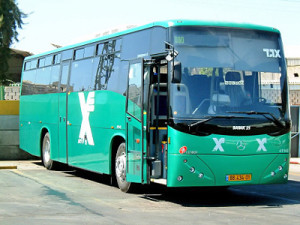 >>Someone mentioned it is very hard without a car in the North. How is it working out for you? <<
>>Someone mentioned it is very hard without a car in the North. How is it working out for you? <<
Generally people looking to move to northern Israel are told that a car is pretty much a necessity, but I don’t agree with this. It really depends where in the north you live.
We had a number of things we wanted in the place we planned to make our home, and one of them was good public transportation. I enjoy driving but I didn’t want to own a car in Israel. The reason for that was primarily financial – the cost of buying a car is significantly more than in the US and the cost of gas is currently about $8 a gallon. Car ownership comes along with other costs as well, like maintenance and insurance, and I was happy to not have these ongoing expenses when we moved to Israel.
Though there are times that I miss the independence and flexibility of having a car, I’m overall pleased with our decision to be car-less. A big part of why this works so well for us is that we consciously looked to live in a central neighborhood of a city with good public transportation. If someone chooses to live in a much smaller town/moshav/yishuv without public transportation running through it, or even in one of the outlying neighborhoods of Karmiel, it would be much harder and in some places not feasible at all.
Karmiel’s local public transportation is great and it’s pretty easy to get to most major cities in Israel from here. As of yesterday, the number of daily buses to and from Jerusalem doubled; I heard that there is now increased service to other cities as well.
Local transportation – in Karmiel an unlimited in-city daily bus pass is just 8.10 shekels for the entire day; this can only be purchased after 9 am. You can also get an unlimited monthly pass, which is a better deal if you take the bus daily (I don’t). A one way bus ticket was 5.50 shekels but probably just went up on Jan. 1 but I don’t yet know how much it is. Our local buses are all new and comfortable. The buses run frequently – I rarely wait more than ten minutes – and there’s not usually any difficulty getting a seat; sometimes you have to wait a stop or two but rarely more than that. Taxis are a fixed rate of 15 shekels for anywhere in the city; 20 shekels to the industrial zone.
I appreciate being able to relax and let someone else do the driving, worry about traffic, parking, repairs- when the bus I was traveling on broke down, it wasn’t my problem. Someone else had to deal with it, not me. If I’m not with kids, then time on the bus is an opportunity for me to read, unwind or rest.
Since so many people don’t have cars, stores routinely offer delivery service. That means when I go into a grocery store, once I check out I don’t see my groceries until someone brings the boxes into my house. Very nice for just 15 – 25 shekels a delivery!
Another advantage of not having a car is that you get more exercise. Nothing is too far away but we’re either walking where we need to go or walking to the bus stop to where we need to go! It keeps us much more active than we’d be otherwise.
Not having a car has limited me in some ways and freed me in other ways. I have to say ‘no’ to places I would want to go because they’re not easily accessible for me – so that simplifies life in some ways. I can’t do the shopping or have the kind of trips I did in the US and that creates more time in my week. Obviously it also means that sometimes I’m unable to do some things that I would really like to do.
There have been times it’s been challenging to be without a car (mostly when our kids have been hospitalized). However, due to the cost of driving many people who have cars choose to use public transportation when traveling long distances unless they can find people who will pay for a ride to cut down on the costs. So at times when you need door to door service it’s a viable option to take a taxi (if within an hour drive) or pay someone with a car for a ride if you can coordinate it. It’s cheaper than maintaining a car throughout the year.
The main time I’ve felt the lack of a car has been when I take Yirmiyahu to the osteopath every 4 – 6 weeks. She’s only a thirty minute drive from our home so by car it would be two hours round trip but by bus it’s at least five hours. Since the bus drops me off on the side of the highway and I have to cross five lanes of highway traffic by foot without a bridge or even a crosswalk (yes, I think this is insane but it’s not uncommon), I’d rather have a better way to get there. I told her this past week that I dislike this trip so much only something really valuable to me (like her services) justifies it!
There’s also the cost and inconvenience of traveling with kids. In a car, it doesn’t cost more to bring your kids along. On a bus, the costs start to add up pretty quickly and of course you can’t make bathroom stops for young children when they need it! My osteopath charges me a family rate per visit, but I haven’t taken advantage of this the way I’d like to because it’s such a pain in the neck to bring the kids with me for the appointments (particularly with the highway crossing to deal with).
For the most part the negatives have been minor and the advantages of not having a car have have outweighed the times we would have found a car useful. Overall, we’ve been really happy to have shed car ownership from our list of obligations!
Avivah

I think bus prices went up yesterday. Just fyi.
Thanks for the reminder – I added the updated info I was aware of into the post!
Let us not forget the train station on the way. That will be awesome.
The train will be amazing! I didn’t write about that because it’s a factor for the future and doesn’t help for now. But when that happens – as well as when the main toll road Kvish 60 is extended to Karmiel, it’s going to dramatically cut the travel time to the center of the country.
Hi Aviva, that was very nice! I linked to it here:
https://sites.google.com/site/kadish67/life-in-karmiel
The excellent public transportation in Israel particularly in Karmiel made our aliyah financially possible! We live at a much higher standard of living than was even possible in the US!